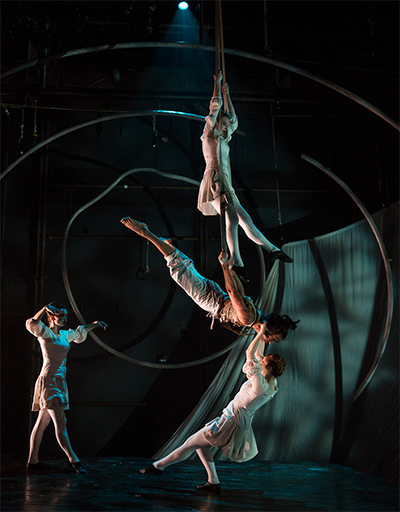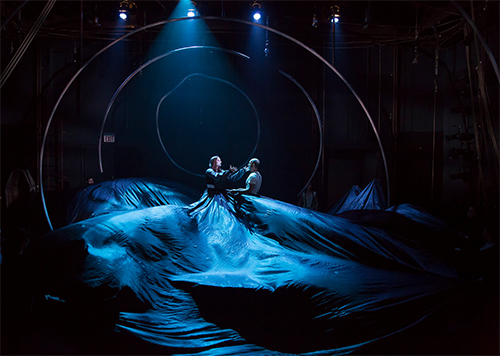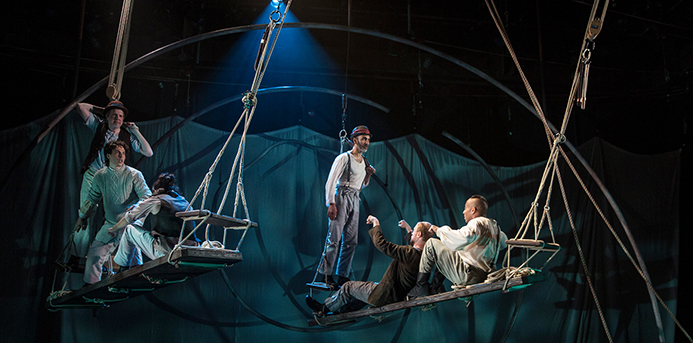When David Catlin was creating Lookingglass Theatre’s stage version of “Moby Dick,” a sentence in the first chapter of Herman Melville’s novel jumped out at him. The narrator (that fellow who introduces himself by saying, “Call me Ishmael”) remarks: “I cannot tell why it was exactly that those stage managers, the Fates, put me down for this shabby part of a whaling voyage…”
Those stage managers, the Fates.
These words made Catlin think about the role that fate plays in Melville’s classic story. How much is Captain Ahab, that manically obsessed whaler, in control of himself? “How much do we control? How much is fate present?” asks Catlin, a founding Lookingglass Ensemble member who teaches at Northwestern University in Evanston.
Catlin came up with the idea of literally showing the Fates onstage — with actresses playing those figures from mythology. They hover around the action on the whaling vessel. This added a female element that was absent in Melville’s novel. “I was struck by what a dude-heavy book it is,” says Catlin, whose 2015 version of “Moby Dick” is back onstage at Lookingglass this summer. “We have one woman who kind of becomes the sea, and the men are lured to her. And then when they die, they return to the sea. We have women as whales, as nature. It made sense to me that these ladies are kind of the abstract physical embodiment of Ahab’s obsession — of his fate.”
Those stage managers, the Fates.
Another thing struck Catlin about that line — the way it mentions theater, describing the Fates as those workers who coordinate all the pieces of a show. “Melville actually uses a lot of theatrical language in his descriptions,” Catlin says. “He’ll say, ‘Lights up on the quarter deck,’ or ‘Curtain up,’ or ‘Enter Ahab.’” And as Catlin points out, ships and theaters share a lot of terminology. “We have what’s called a stage crew,” he says. “We refer to the stage as a deck, which is a ship’s term.”
That inspired Catlin to create a show where the theatrical craft is visible. Audience members can see the ropes being pulled to move pieces of scenery, much like ropes being pulled on a ship to raise a sail. “We’re exposing the theater and seeing some of the similarities,” says Catlin, who collaborated with Evanston-based Actors Gymnasium on the play. “I’m interested in shows where you see the theater and you’re aware of it.”

Catlin’s version of “Moby Dick” grew out of a grant from Boeing, which commissioned three Chicago theatrical groups — Lookingglass, Blair Thomas & Co. and House Theatre — to share ideas as they each developed a show inspired by the Melville novel. The Lookingglass play won four Jeff Awards, including best new adaptation and best large production of a play. After that, Catlin took it on the road to Atlanta, Washington, D.C., and California. As the play returns to Lookingglass, it’s a bit streamlined. “We realized there were things in there that were unnecessary,” Catlin says. Now, he says, “It feels like everything is building to the culminating event.”
Catlin says some people have asked him why he would adapt “Moby Dick,” a novel that is notoriously difficult to read. “It’s a book a lot of people hate or have a bad experience with,” he acknowledges. But Catlin loves the characters — including Ishmael, just to cite one example. “He is unconnected to anyone. He is unmoored. He doesn’t know what to do. If we’re all being a little bit honest, I think we can all identify to some extent with that — at some point in our lives. And in those moments, we often do what Ishmael does and we find ourselves at the water’s edge.”

Catlin casts his mind back to his youth in Pittsburgh, when he decided to attend Northwestern. “One of the reasons that I picked Northwestern was because it was next to this big, beautiful sharkless body of water — Lake Michigan. And that’s where Ishmael finds connection, there at the water’s edge.”
Northwestern was where Catlin met a cohort of undergrads “studying theater to seek, to understand what it was to be human,” he recalls. That sense of curiosity inspired them to found Lookingglass in 1988. Almost three decades later, they’re still on that quest, searching for answers on theatrical journeys like “Moby Dick.” You might call it fate.
“Moby Dick” runs June 7 to Sept. 3 at Lookingglass Theatre, 821 N. Michigan Ave., Chicago. Learn more and buy tickets here.

Robert Loerzel is a freelance journalist who lives in Chicago’s Uptown neighborhood. His work has also appeared in Playbill and on WBEZ, and he is the author of the book “Alchemy of Bones: Chicago’s Luetgert Murder Case of 1897.”

